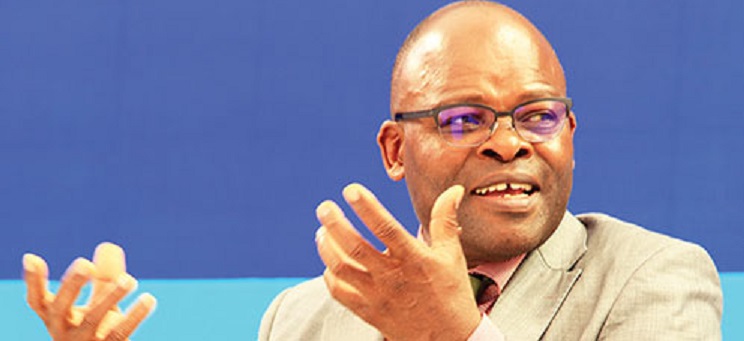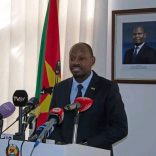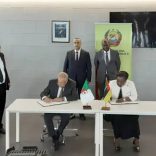Mozambique: Up to the government to find a solution for the €1.53B in outstanding balances - ...
“Central Bank took the worst possible measure” – Economist Roberto Júlio Tibana

O País / Roberto Júlio Tibana
Economist Roberto Júlio Tibana has condemned Mozambique’s central bank for increasing interest rates and suggests that the solution to the country’s debt problem lies in cutting government spending, and above all in achieving peace.
O País: What impact will the changes in interest rates decreed by the Bank of Mozambique have on Mozambican families and companies?
Roberto Júlio Tibana (RJT): It is not “will have”; I think it is “already having”! The commercial banks were very quick to follow the path indicated by the monetary policy interest rate, and this will impact on the cost of money to companies for production, the cost to households for consumption, for investment in housing, for servicing debts that people already have. Will have, in short, a negative impact, because it will force people to review the family budget and, of course, they will have to tighten their belts a little more. And there will be a situation where people were already on the edge because our middle class is very vulnerable. Therefore, the impact is serious.
O País: Observing these limits, and considering that many people are already at the limit in terms of their efforts to repay loans, will this increase be affordable?
RJT: All major players in this economy – the state, families, businesses – have been on the threshold of a critical situation in recent years. The verdict of the IMF when it left was clear – the economy was heading towards an unsustainable debt situation. But the debt of companies and households was already growing even then, and this increase in interest rates will be the final blow for a good portion of family and businesses. But the biggest problem is that all this will require greater constraint on household and company expenditure, which will further jeopardize economic activity. Because of the contraction of demand and a contraction of companies’ supply capacity, these additional costs will further complicate the economic situation, but it was not there where it should take effect (in families and companies) – it was in the state. It turns out, as we know, that the state has not agreed to restrictions; therefore, it is transferring them to us. Interest rates are rising, credit to households and businesses will fall, but the central bank and the banks will continue to fund the government.
O País: Taking these considerations into account, what alternative measures would you suggest?
RJT: It would be very dishonest, if I were now to say, as an economist, to my colleagues of the central bank, the measure you took was the right one. On the contrary, I think it was most imprudent to do as they did, both because of the proportions, the 300 basis points, and from one day to the next, to what purpose? Even in the history of the monetary policy of the Bank of Mozambique we do not find such things, much less anywhere in the world, with such frequency, as an instrument of monetary policy. Not even in circumstances of crisis like this. So I can not applaud them at this time. I think that either it is a panic reaction or it is a situation which is not understand from a technical point of view. If they thought that 300 basis points is what the economy needs in the medium term to be able to reorient the preferences of economic agents … because, talking about drying up liquidity – I do not see the liquidity that is to be settled, at least not with a lot of legitimacy. Because the first thing they should have done was to stop the galloping state expenditure, because that is the deficit, and above 5 percent overall deficit, that is creating problems for the economy. They have been creating these problems, and they have exploded over the last three, four years, and it is inconsistent that, when trying to correct the situation, they carry on – and then ask families, businesses for restrictions … The adjustment has to come from the fiscal side and the monetary side will not do anything.
O País: The Bank of Mozambique expects to begin to see the results of the measures they are taking from the first quarter of next year. Do you think it’s possible to begin to achieve results from that time?
RJT: It is quite possible to have an instrument that tells them that the lag between the time you make that decision and timing of effects is three years, but I read the IMF’s statement and it has nothing … But it may be that those came ‘a posteirori’ or at the press conference to explain the details that I have not kept up with, etc. etc. If they have this instrument, then show it to us and explain.
O País: Can we expect the 4.5 percent growth rate the government expects, given that companies will be finding access to financing more difficult?
RJT: I think we have to think in terms of segments, because there are many uncertainties. At this time, I prefer to think of this value as the maximum amount we might hope for, but very difficult to achieve, and then consider the Standard Bank figure, which is lower, and then see what will happen within this range. But I think that four percent will be very difficult to achieve.
O País: Is there room for people, collectively or individually, to renegotiate their debts with their banks?
RJT: Of course! Any bank should be interested in sitting down with clients and ask about their situation. What I would you advise is, whether you are an individual or a company that cannot meet your obligations, to contact your credit manager sooner rather than later and discuss how you will resolve the situation without complicating your business or the business of the bank concerned further.
O País: At this time, banks are taking advantage and applying very high interest rates. What can be expected in the medium and long term, considering that some people will go into default?
RJT: The banks are considering how to balance their accounts and not get drawn in any deeper, because they also are being affected by these measures – for example, the mandatory reserve rates (the money banks have to deposit with the central bank as a warranty). These rates were also high, which means that for every metical you deposit, the banks have to take a larger portion of this amount to deposit with the central bank – it is money that can not be lent. Therefore, the money they have to borrow is now less than they had before because a bigger share goes to the Bank of Mozambique and this applies both to deposits in meticais and in dollars. Now, if a bank that faces such a situation then also has bad debts with companies, how will it balance its accounts?
O País: In the third quarter of 2015, the Bank of Mozambique reduced key interest rates, but the reaction of commercial banks was not the same as now with these increases. That is, the central bank reduced rates, but commercial banks often kept theirs up. Why?
RJT: The phenomenon often happens – prices are much more resistant to going down than to going up. Now, this should not be so: prices should be more flexible. This depends on the nature of the market, but the regulator has an obligation to control it.
O País: So we come back to the initial question: what is the real impact of debt on the Mozambican economy? What can be done at this point in time?
RJT: You have to put all this in context. This is not only an economic crisis; it is a political crisis, a military crisis, and all these things come together and influence each other to determine the final course of events. The political crisis in such a situation will worsen the economic crisis that already existed. People must first think of the national interest – the leaders. Those who consider themselves truly leaders in this country – let them think about the national interest, which is peace. There are many differences – let them find a way to bring all the forces that can contribute to peace together. Because it will be a peace brought forth from between two forces which, by the way, sit together from a position of strength. If so, if that peace comes, it will be very limited, with no depth, and it will not have reconciliation, which is the key. It has to be a conversation in a family that got in trouble but where people can sit and look at each other and say, ‘I forgive you or not, who has not offended you?’ – and say, ‘If you can forgive me, forgive me, and we will try to go forward as brothers’. I think that’s what Mozambican society wants above all. And if it fails again, expectations will have been betrayed.
Profile
Roberto Julio Tibana holds a Doctorate in Philosophy of Economics, University of Oxford, UK, in 1997, a Master in Development Economics and Agricultural Economics from Oxford (1993) and the University of Reading (1988) respectively. Tibana’s area of work includes macroeconomics and management of public finances (including forecasting and tax planning), and poverty reduction. He has 25 years of professional experience as an economist, in teaching, research, consultancy and advice, with international organisations and national governments.













Leave a Reply
Be the First to Comment!
You must be logged in to post a comment.
You must be logged in to post a comment.